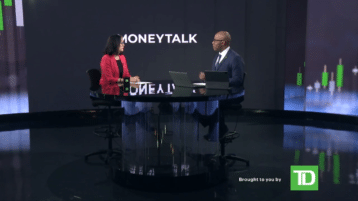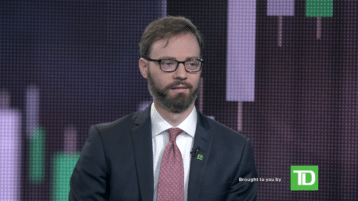The Bank of Canada has signaled a pause in future rate hikes for now. But there are concerns about the impact the run-up in rates may have on housing down the road. Greg Bonnell speaks with Francis Fong, Senior Economist at TD, about why he thinks any systemic declines are unlikely going forward.
Print Transcript
[AUDIO LOGO]
While the Bank of Canada has signaled a pause in rate hikes, some are concerned that the real hardship for the housing market is yet to come, that as households deal with higher debt payments. Joining us now to discuss why he's not seeing those cracks in the real estate market at this point, TD senior economist Francis Fong. Francis, great to have you back on the program.
Thanks for having me, Greg. Great to be here.
Let's talk about that, right? There's a lot of musings and reports that I've seen lately that the Bank of Canada says we're going to pause right now, but as households just digest the sheer enormity of what we got in terms of rate hikes, the worst is yet to come. How should we be viewing this?
Yeah, I mean, it's an excellent question and a good place to start. And really, I think if you look at where debt service costs are headed, the dramatic increase in interest rates we've seen just over the last year or so is really going to drive that ratio significantly higher to a point that we haven't seen in quite a few decades. And that obviously has a lot of people-- giving people cause for concern.
But if we take a flip-side approach to it, there's some key ingredients that we do need to see before we can conclude that there might be a more systemic decline in home prices. If we look at home price crashes around the world historically, one of the key ingredients preceding those crashes was always a build-up of bad credit. So take the 2000 to 2006 run-up in home prices in the US.
We saw a lot of subprime mortgages gaining share in originations. And ultimately, when interest rates or problems arose, that's actually where you saw the problem. If we look at Canada, we just don't see that major ingredient. If anything, it's actually going in the opposite direction.
Credit quality is getting-- and maybe this is a bit maddening for people-- is getting better. The most recent data we have is a bit delayed, so it's only for the second quarter of 2022. But at the time, we saw the ratio of new mortgage originations that were of a Beacon score of 600 and lower, or what you'd consider a bad credit quality, it was just 0.6 percentage points of mortgage originations. Whereas, again, the flip-side, the number of new mortgage originations that were of a very high credit quality was at a record high 89%, close to 90%.
So if you have that kind of buffer of good credit quality borrowers, the ones who are actually driving prices higher and higher and higher, then notionally, even if we're hit with this kind of shock, then there is at least that buffer. That's not a guarantee that we won't have a systemic problem. If we roll back the clock five, 10 years, and you asked an economist, what would drive a systemic problem in the housing market, you'd always say, an increase in the unemployment rate and--
GREG BONNELL: That's what I always heard. It was always about jobs. As long as you got your job, you keep your house. You see a spike in unemployment, then we got problems.
That's right, and a combination with an increase in interest rates. But even historically, that hasn't even panned out either. Let's look at Alberta.
After 2014, oil prices crashed. We did see an increase in interest rates to a level that a lot of folks did say that they couldn't necessarily afford. And we saw essentially what? A flat-lining in home prices over a long period of time. The oil prices were depressed in that province alone. Everywhere else was doing fine, but Alberta single-handedly went through this mini crisis, and home prices still didn't fall that much.
So where are we today? We've seen home prices pull back quite a lot. But we haven't even unwound the 50% price gain that we saw just since 2020. So there could potentially still be more downward pressure. But with the Bank of Canada having paused at this point and the labor market is still strong-- and, of course, credit quality being good-- it is difficult, necessarily, to envision a situation where we'd have a systemic problem.
How much of that pause, in your estimation, from the Bank of Canada was the very fact that we have this dynamic in the Canadian market? Big run-up in prices. People took out big loans, including mortgages. And the bank told us in the early days of the pandemic, go for it. If you need to borrow a large amount of money for a big purchase or an investment, don't worry about it.
Well, things turn pretty quick. Is that a chief concern for them now?
You know what? I would say yes, but a lot of it also has to do with timing. As many people would be familiar, it does take about 12 to 18 months for the full impact of interest rate increases to filter in the economy. While we're about one year out from that first interest rate increase, inflation has turned, as you already noted, both in the US and Canada. And so now is actually kind of a perfect time for the Bank of Canada to pause and say, OK, we have this vulnerability.
Household debt is as high as it's ever been. It's far higher than many of our advanced counterparts. We've seen the sharpest increase in interest rates in decades. Maybe it's a good time to take pause and just see how those first interest rates are going to start trickling through, and then we'll readjust from there.
In our baseline forecast, we don't necessarily have them hiking anymore. In fact, like many forecasters, we are anticipating some interest rate decreases down the line. But from a pausing perspective, it's a timing thing, too.
How much has the stress test played into any theories we maybe have of some resilience? Even though we have seen sales activity fall pretty dramatic, we've seen prices come down, but this idea that you're not going to see forced selling-- did that help?
Remember at the time the stress test came out, and there were some industry players who said, 2%, are you joking? In what scenario would you see interest rates jump 2% in short order? And then we slid through more than 400 basis points.
[LAUGHS] Well, and a little bit of a personal anecdote. I was involved in a lot of that scenario generation work and creating these scenarios that had high interest rate increases. And we did toy with a lot of ideas, a lot of different potential variations of scenarios that saw higher interest rates. Did we forecast at the time they would increase by this much and inflation would be as high as it is? I think this is certainly a lot higher than we would have predicted, even in a stress test.
That being said, I think, to your point, the results of those exercises does give regulators and central banks some comfort that capital buffers are sufficient enough to at least absorb some of the impact. Again, because we're not predicting, necessarily, this huge crash in all sorts of different kinds of assets, those capital buffers won't ever be tested to the point where we're in that kind of deep stress scenario. But even if we were, notionally there's at least some comfort that regulators can draw from.
Another argument people make is that the Canadian housing market won't see a more dire consequence because of our elevated immigration levels and our very robust targets. Do people who fall maybe in a real estate bull side put too many eggs into that basket, or is there something really happening there?
You know what? I think there's probably a nugget of truth to that. And there's this double whammy impact of the pandemic afterwards. We still haven't seen 100% of folks return to office. Work from home is now a standard across all workplaces in the advanced world. And that has had an interesting dynamic in terms of driving home prices up, not just in the major metropolitan areas, which is what we would have been used to in the previous years prior to the pandemic, but elsewhere. In fact, we've seen higher home price growth outside of major metropolitan areas than inside of major metropolitan areas.
And then combine that with our continued high immigration numbers, and I think that there is some nugget of truth that there's potentially a floor that gets put under housing because of that consistent demand. And you know what? I would always point to the notion that housing is a very unique asset in this regard. It is the only asset that-- it acts in the same way as a financial asset that you also consume, like you consume housing services when you live in your own home.
And so a housing asset can act as capital preservation. You can rent it out in a loosening but still extremely tight rental market. If anything, a lot of folks, and we're seeing this in the listings data, can just sit on that asset as a form of capital preservation. So there's lots of different ways in which housing performs differently than a traditional financial asset in that regard. [AUDIO LOGO]
[MUSIC PLAYING]
While the Bank of Canada has signaled a pause in rate hikes, some are concerned that the real hardship for the housing market is yet to come, that as households deal with higher debt payments. Joining us now to discuss why he's not seeing those cracks in the real estate market at this point, TD senior economist Francis Fong. Francis, great to have you back on the program.
Thanks for having me, Greg. Great to be here.
Let's talk about that, right? There's a lot of musings and reports that I've seen lately that the Bank of Canada says we're going to pause right now, but as households just digest the sheer enormity of what we got in terms of rate hikes, the worst is yet to come. How should we be viewing this?
Yeah, I mean, it's an excellent question and a good place to start. And really, I think if you look at where debt service costs are headed, the dramatic increase in interest rates we've seen just over the last year or so is really going to drive that ratio significantly higher to a point that we haven't seen in quite a few decades. And that obviously has a lot of people-- giving people cause for concern.
But if we take a flip-side approach to it, there's some key ingredients that we do need to see before we can conclude that there might be a more systemic decline in home prices. If we look at home price crashes around the world historically, one of the key ingredients preceding those crashes was always a build-up of bad credit. So take the 2000 to 2006 run-up in home prices in the US.
We saw a lot of subprime mortgages gaining share in originations. And ultimately, when interest rates or problems arose, that's actually where you saw the problem. If we look at Canada, we just don't see that major ingredient. If anything, it's actually going in the opposite direction.
Credit quality is getting-- and maybe this is a bit maddening for people-- is getting better. The most recent data we have is a bit delayed, so it's only for the second quarter of 2022. But at the time, we saw the ratio of new mortgage originations that were of a Beacon score of 600 and lower, or what you'd consider a bad credit quality, it was just 0.6 percentage points of mortgage originations. Whereas, again, the flip-side, the number of new mortgage originations that were of a very high credit quality was at a record high 89%, close to 90%.
So if you have that kind of buffer of good credit quality borrowers, the ones who are actually driving prices higher and higher and higher, then notionally, even if we're hit with this kind of shock, then there is at least that buffer. That's not a guarantee that we won't have a systemic problem. If we roll back the clock five, 10 years, and you asked an economist, what would drive a systemic problem in the housing market, you'd always say, an increase in the unemployment rate and--
GREG BONNELL: That's what I always heard. It was always about jobs. As long as you got your job, you keep your house. You see a spike in unemployment, then we got problems.
That's right, and a combination with an increase in interest rates. But even historically, that hasn't even panned out either. Let's look at Alberta.
After 2014, oil prices crashed. We did see an increase in interest rates to a level that a lot of folks did say that they couldn't necessarily afford. And we saw essentially what? A flat-lining in home prices over a long period of time. The oil prices were depressed in that province alone. Everywhere else was doing fine, but Alberta single-handedly went through this mini crisis, and home prices still didn't fall that much.
So where are we today? We've seen home prices pull back quite a lot. But we haven't even unwound the 50% price gain that we saw just since 2020. So there could potentially still be more downward pressure. But with the Bank of Canada having paused at this point and the labor market is still strong-- and, of course, credit quality being good-- it is difficult, necessarily, to envision a situation where we'd have a systemic problem.
How much of that pause, in your estimation, from the Bank of Canada was the very fact that we have this dynamic in the Canadian market? Big run-up in prices. People took out big loans, including mortgages. And the bank told us in the early days of the pandemic, go for it. If you need to borrow a large amount of money for a big purchase or an investment, don't worry about it.
Well, things turn pretty quick. Is that a chief concern for them now?
You know what? I would say yes, but a lot of it also has to do with timing. As many people would be familiar, it does take about 12 to 18 months for the full impact of interest rate increases to filter in the economy. While we're about one year out from that first interest rate increase, inflation has turned, as you already noted, both in the US and Canada. And so now is actually kind of a perfect time for the Bank of Canada to pause and say, OK, we have this vulnerability.
Household debt is as high as it's ever been. It's far higher than many of our advanced counterparts. We've seen the sharpest increase in interest rates in decades. Maybe it's a good time to take pause and just see how those first interest rates are going to start trickling through, and then we'll readjust from there.
In our baseline forecast, we don't necessarily have them hiking anymore. In fact, like many forecasters, we are anticipating some interest rate decreases down the line. But from a pausing perspective, it's a timing thing, too.
How much has the stress test played into any theories we maybe have of some resilience? Even though we have seen sales activity fall pretty dramatic, we've seen prices come down, but this idea that you're not going to see forced selling-- did that help?
Remember at the time the stress test came out, and there were some industry players who said, 2%, are you joking? In what scenario would you see interest rates jump 2% in short order? And then we slid through more than 400 basis points.
[LAUGHS] Well, and a little bit of a personal anecdote. I was involved in a lot of that scenario generation work and creating these scenarios that had high interest rate increases. And we did toy with a lot of ideas, a lot of different potential variations of scenarios that saw higher interest rates. Did we forecast at the time they would increase by this much and inflation would be as high as it is? I think this is certainly a lot higher than we would have predicted, even in a stress test.
That being said, I think, to your point, the results of those exercises does give regulators and central banks some comfort that capital buffers are sufficient enough to at least absorb some of the impact. Again, because we're not predicting, necessarily, this huge crash in all sorts of different kinds of assets, those capital buffers won't ever be tested to the point where we're in that kind of deep stress scenario. But even if we were, notionally there's at least some comfort that regulators can draw from.
Another argument people make is that the Canadian housing market won't see a more dire consequence because of our elevated immigration levels and our very robust targets. Do people who fall maybe in a real estate bull side put too many eggs into that basket, or is there something really happening there?
You know what? I think there's probably a nugget of truth to that. And there's this double whammy impact of the pandemic afterwards. We still haven't seen 100% of folks return to office. Work from home is now a standard across all workplaces in the advanced world. And that has had an interesting dynamic in terms of driving home prices up, not just in the major metropolitan areas, which is what we would have been used to in the previous years prior to the pandemic, but elsewhere. In fact, we've seen higher home price growth outside of major metropolitan areas than inside of major metropolitan areas.
And then combine that with our continued high immigration numbers, and I think that there is some nugget of truth that there's potentially a floor that gets put under housing because of that consistent demand. And you know what? I would always point to the notion that housing is a very unique asset in this regard. It is the only asset that-- it acts in the same way as a financial asset that you also consume, like you consume housing services when you live in your own home.
And so a housing asset can act as capital preservation. You can rent it out in a loosening but still extremely tight rental market. If anything, a lot of folks, and we're seeing this in the listings data, can just sit on that asset as a form of capital preservation. So there's lots of different ways in which housing performs differently than a traditional financial asset in that regard. [AUDIO LOGO]
[MUSIC PLAYING]



























